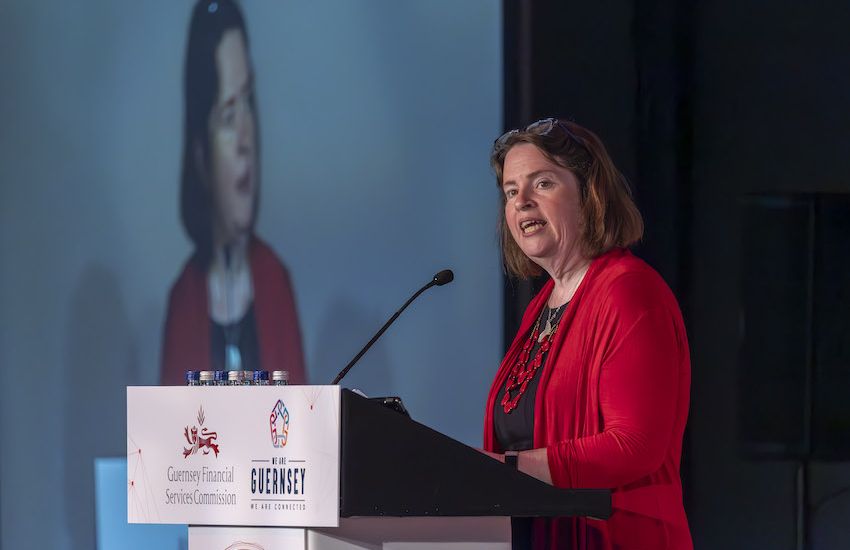


Not enough conversation is being given to changing educational aims to fit the rapid advancement of technology and meet the skills gaps, a senior local principal has warned.
Daniele Harford-Fox, Principal of The Ladies College, made the claims in a widely praised speech at an AI summit yesterday, which was jointly hosted by the Guernsey Financial Services Commission and Guernsey Finance.
Her comments also came just days after local politicians tore up the Education Committee’s plans to reform the decades old Education Law, with serious concerns expressed that government would’ve maintained too firm a grip over individual schools and unduly extended control to the grant-aided colleges.
She said she spoke as “someone who believes powerfully in the moral responsibility to equip our children for the future, and who also thinks the time has come to ask some pretty fundamental questions.
“I think deep in our hearts, we know that the current British education system is not fit for purpose.”
Year 7 students who will exit education in 2030 will have to grapple with a profoundly different landscape, Ms Harford-Fox argued.
“The world will look different. The jobs that their parents and grandparents moved into may no longer be available. The skills they need will have changed. The deadline for the climate change agreement will have passed, and AI will be reshaping our culture and economy in ways we can't imagine.
“Simply holding onto the ways we have always done things and holding onto systems that make us feel safe and comfortable is not good enough.”

Pictured: The summit attracted hundreds of attendees and top speakers from UK universities and tech institutions. Credit: Chris George Photography.
She told over 350 delegates at the summit that education is a sector which has consistently resisted moving with the times.
“If you honestly look at the system, the answer to why we teach something is because we always have and because it will improve a child's performance on an exam we teach in subjects - because that's what our teachers did in classes.
“The current education system has been the same for the last 200 years. League tables and judging schools based solely on results has led to a real change in school culture. And so, skills narrowed. Further memorisation, imitation, and regurgitation became the order of the day.”
This means the latest set of graduates are not being equipped with the correct skills for the modern world, she added.
In a small sized jurisdiction experimentation should be considered: “We're really well equipped in Guernsey to not only move into this space, but to start to lead."
Next up is Danielle Harford-Fox, Principal of @LCGSY. Danielle will discuss the impact of technology and AI on education.#WeAreGuernsey #WeAreConnected pic.twitter.com/My1i1X6I48
— WE ARE GUERNSEY (@WEAREGUERNSEY) June 28, 2023
Ms Harford-Fox accepted there are no easy answers on what the right skills to teach are, or how to do it, but there is growing consensus that AI must be part of the equation.
“The careers that generations of young people have gone into knowing they'll be safe routes to a good life are the very roles that are in jeopardy. Accountancy, areas of law, medicine, and actuarial science are all very much in the sight of this technology,” she said,
“And sadly, it now seems that many of the more creative roles, which early speculations thought would be exempt from the revolution, are also going to be in the firing line.
“The question isn't how can we stop the technology writing better essays, the question is if the technology can write a better essay, why is essay writing at the heart of what we are teaching?”
Students must be equipped to “understand influence, to be able to separate truth from noise, and to be resistant to manipulation or false information,” she added.
Flexibility will also be key in the coming decades.
“They will need to be curious, critical thinkers and innovators. They will need to be communicators, understand context and the mechanisms of influence. But more than all that, most powerfully and most essentially, they will need to be flexible emotionally and intellectually,” Ms Harford-Fox said.
“Too often the majority of those 14 years of education, and the majority of what we assess and communicate as important, is about memorisation and rigidity, not about flexibility.”

Pictured: Deputy Andrea Dudley-Owen, President of ESC, was in the audience. Credit: Chris George Photography.
Ms Harford-Fox also criticised the approach, or lack thereof, being taken by British education institutions and Prime Minister Rishi Sunak with regards to AI.
“The state sector and UK government is even more behind, with the JCQ, which oversees British examination assessments, publishing its position that we should simply try to ignore ChatGPT.
“And Rishi Sunak’s solution of essentially more maths A-levels to solve the educational skills gap seems hideously out of touch with the challenges ahead.
“The voices of Silicon Valley have been warning that we are about to see an industrial revolution perhaps unparalleled in human history.”
She said The Ladies College has recently become one of 60 ‘Microsoft Showcase’ schools across the UK. It has replaced Latin studies with coding, and included lessons to help understand the role of technology and the media.
The College has also hired a director of innovation to focus on curriculum development, experimenting with sixth form curriculum from 2024.
Deputy Andrea Dudley-Owen, President of Education, Sport & Culture, spoke from the audience to “reassure” that flexible classroom content and a “really strong focus on skills” is included within the overarching Bailiwick Curriculum.
But she admitted the Committee is having to “race to keep up” with the changes.
Ms Harford-Fox said more partnership working with the private colleges could help, and that she has personally had conversations to that end with senior education officials in the States.
She also called on businesses and other stakeholders to engage with education providers to develop improved training programmes for all.
Pictured (top): Daniele Harford-Fox. Credit: Chris George Photography.
Businesses should train staff on safe use of AI
FOCUS: Guernsey Institute taking proactive approach to AI
Comments
Comments on this story express the views of the commentator only, not Bailiwick Publishing. We are unable to guarantee the accuracy of any of those comments.